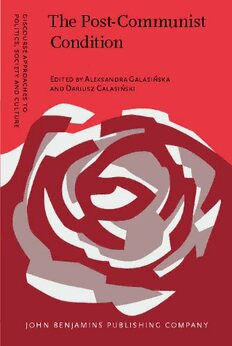
The Post-Communist Condition: Public and Private Discourses of Transformation PDF
279 Pages·2010·1.7 MB·English
Most books are stored in the elastic cloud where traffic is expensive. For this reason, we have a limit on daily download.
Preview The Post-Communist Condition: Public and Private Discourses of Transformation
Description:
This volume offers interdisciplinary perspectives on discourses in one national context of post-communist transformation. Proposing a macro-micro approach to discourse analysis and transformation, it examines a spectrum of topics including Polish history, with its ‘interpreters’; changes in political bodies and the media, policies of the Catholic Church and the Institute of National Remembrance; xenophobia and anti-Semitism, with the emergence of unemployment and homelessness; experiences of new gender relations and migrations. In effect, drawing upon unique sets of data, the book shows how post-communist transformation can be understood through analyses of the changing public and private discourses. It shows Polish post-communism as a fragile and uneasy transformation, with people and institutions struggling to make sense of it and of life within it. The volume will be of interest to a broad range of social scientists: discourse analysts, sociologists, modern historians and political scientists, as well as to the informed lay public.
See more
The list of books you might like
Most books are stored in the elastic cloud where traffic is expensive. For this reason, we have a limit on daily download.
